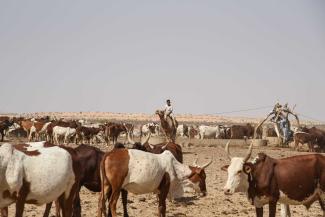Security
Islamist extremists operate like typical insurgents

According to the conventional wisdom, West Africa is currently witnessing a struggle between violent Islamism and democratic statehood. Is that the ground-level reality?
The conventional wisdom is not very helpful. If it were, we would not be witnessing a spill-over of the crisis from the Sahel region to the southern fringes of the Sahara to coastal states. Let me deconstruct both concepts. The recent wave of coups has shown that typically there was only a democratic façade. Yes, there had been elections with voters casting ballots, but the elected leadership was largely ignoring people’s demands. There was no real social contract, according to which people have rights and duties and which defines how the state relates to its citizens. This disconnect is especially pronounced in remote rural areas.
And what about violent Islamism?
We did interviews with hundreds of people who are involved in violent extremism at the grassroots level. We found that foot soldiers and lower-level leaders are engaged for various reasons, but rarely as a result of religious indoctrination. The top leadership uses fundamentalist rhetoric, which they may believe in, but faith doctrines are quite obviously not motivating all members of their organisations.
So what were the drivers?
There are many, but the need for protection is a key motivation. People want to be safe, and they want their families, their communities and their income generating activities to be safe too. If a family member joins a specific extremist group, that group will generally not attack his family.
That sounds like a typical Mafia-type protection racket.
My point is that there is actually no major difference between jihadists and other armed groups, whether you consider rebels, Mafia gangs or vigilantes. They all need to recruit fighters, need means of operation and need financial means. The idea that extremist violence was all about religious fundamentalism did not allow us to see that the modus operandi is not new at all. It makes more sense to think in terms of an insurgency. The patterns of recruitment are the same. The extremists are very good at linking their operations to locally specific grievances which result from failures of governance. Basic social needs are not met, starting with security and ranging from infrastructure to the rule of law and economic opportunities. Moreover, many people feel neglected or even abandoned by state agencies.
So the conflict is driven by the disconnect between the governments and their peoples? Vladimir Antwi-Danso of the Ghana Armed Forces Command & Staff College recently pointed that out too (see his contribution on www.dandc.eu).
We are witnessing a comprehensive failure of governance. In the lack of a meaningful social contract, the political system, the legal system and the economy aren’t working – and certainly not in ways that would allow people to prosper. Instead, many see their very survival at risk.
What about economic drivers?
Well, we keep being told that unemployed young men join the extremists, but that is not the full picture. Our research showed many recruits actually want protection for existing income generating activities. In central Mali, for example, some wanted their families’ cattle herds to be safe – and not only from robbers, but also taxation by a government agency that they see as unfair. In other cases, people said they were hunters, but the government considered them poachers. People involved in illegal artisanal gold mining have also sought protection with violent groups.
Are there lessons for policymakers?
Yes, of course. Projects geared to job creation are not enough when people also need the preservation of existing income generating activities. That should be on the agenda too, as well as attempts to make them more attractive. The issue of protection and the role of states as providers of impartial security are also key. This should not be only the job of international agencies. National governments should lead. All too often, however, state action comes late or is not perceived to be fair, so frustration grows.
Do tribal, linguistic and faith differences matter?
To some extent, they do, but not in an essentialist way. Both state actors and extremists exploit such differences in manipulative ways. We have to be careful about using easily available categories. There are not only clashes between communities, but within communities too - for example, when leadership is contested.
What are the international dimensions? After all, the conflict is spilling over from one country to another.
It would indeed be wise to pay more attention to international linkages. Our research showed that motorbikes which were used for attacks in the border region of Mali, Burkina Faso and Niger had been brought to the region from Nigeria via Benin. That is a long supply chain. The extremists need fuel, ammunition and arms, for example. They make money, for instance by selling stolen cattle or illicitly extracted gold from the Sahel to coastal countries. Better policing of the trade routes might make a difference. However, that would have to be done in ways that do not cause additional frustrations. At the ISS Africa we insist that all interventions should be based on a deep evidence-based understanding of local contexts. The goal must be to put out flames, not to stoke the fire. And if governments invest more in preventive action, it could avoid flames from starting in the first place.
Who should assume responsibility? The governments of the Economic Community of West African States (ECOWAS) or of the more encompassing AU?
The national governments have a role to play. And both ECOWAS and AU are relevant. For a long time, the conventional wisdom focused on the Sahel as though it had no connections to the rest of the region and the continent. Linkages and supply chains are still largely being neglected, and some of them extend beyond ECOWAS.
Is there a role for the UN?
Yes, and it is already paying close attention, with the UN mission in Mali (MINUSMA) and the UN office for West Africa and the Sahel (UNOWAS). The ultimate fear is that West Africa could become a breeding ground for international terrorism. UN involvement is important, and so is EU involvement.
The French mission in Mali failed however.
Yes, many mistakes were made. We should remember, however, that things were difficult from the outset. Various responses from ECOWAS and the AU were being discussed in 2012 and 2013, but the USA and the UK opposed an African-led mission funded with UN assessed contribution. So it caught everyone unprepared when, in January 2013, separatists and violent extremists looked likely to march on Bamako, Mali’s capital, soon. After the French Serval intervention and the holding of election in 2013, the compromise was to complement a UN stabilisation mission with a French counter-terrorism operation.
And that was nobody’s preferred choice?
No, but it was what could be agreed upon and funded. The French counter-terrorism objective was to defeat the extremists by eliminating the leadership. The problem is that this strategy does not address the underlying frustrations on which the extremists thrive. So when some leaders are killed, new leaders step in fast. More attention should have been paid to what allows extremists to recruit, operate and expand. That was not necessarily the French troops’ job alone, but it should not have been neglected. Adding to the problems, Malian soldiers felt belittled by their French counterparts, and post-colonial resentments kept growing. All of this played a role in the French decision to withdraw.
Are you saying that there can’t be a military solution, so we must focus on a political solution?
This is not a question of either/or. The military response is necessary, but it is not sufficient. Other issues matter too, in particular taking into account the needs of the people, and this requires crafting solutions that will address multiple governance deficits on the political, justice, security and economic fronts.
How do you assess the Russian involvement in Mali?
There is a lot of propaganda on all sides, so the picture is not clear. What is clear is that there were high levels of dissatisfaction with existing military and security arrangements in place in Mali since 2013. The Russian support has given Mali’s army a feeling of being almighty, not least due to new equipment they always wanted. They now have capacities for aerial surveillance and airstrikes. In addition to human-rights abuses, the great risk is that efforts towards a stronger army may distract Mali’s military regime from the underlying, non-military problems which, to achieve stability, must also be addressed.
Lori-Anne Théroux-Bénoni heads the Dakar-based Regional Office for West Africa, the Sahel and the Lake Chad Basin of the Institute for Security Studies (ISS Africa). The head office is in South Africa. l
benoni@issafrica.org










